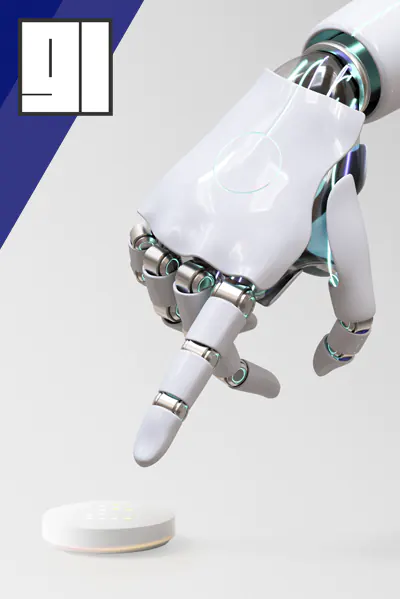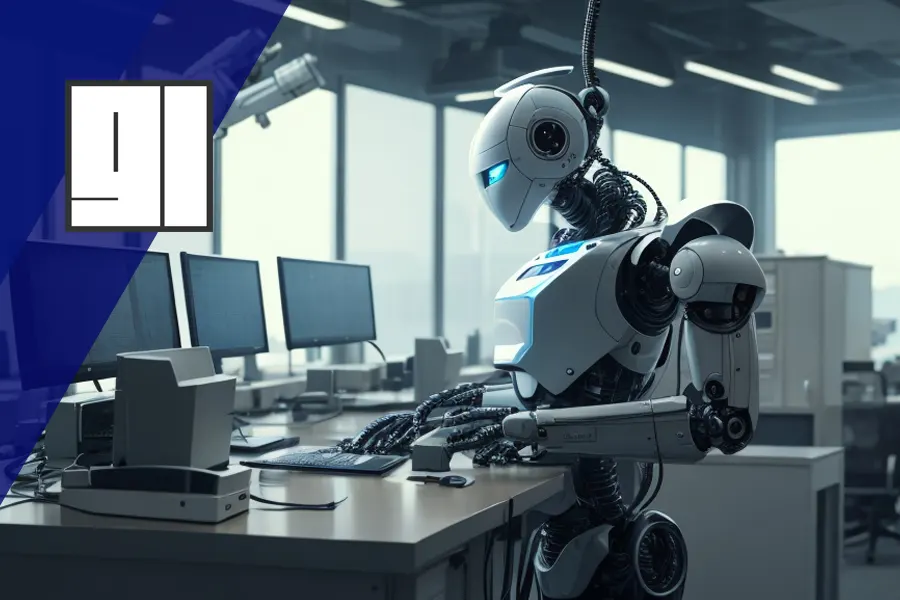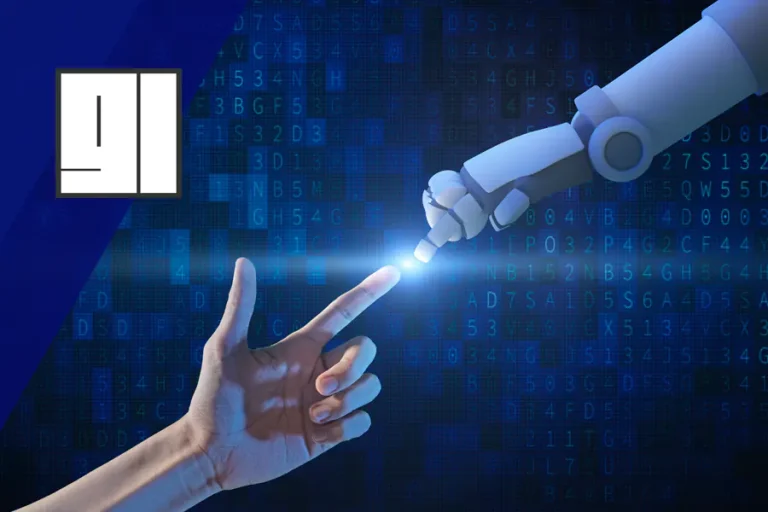AI Automation Service: the Future is now
In the rapidly evolving world of technology, AI automation service has emerged as a game-changer. It’s transforming business operations and societal norms while opening up new avenues for economic growth and employment opportunities. This blog post delves into the intricacies of this disruptive technology.
What’s In It For You?
- Challenges: Learn about challenges of AI automation.
- Opportunities: Discover opportunities in the age of AI automation.
- Industries: Learn how different industries are revolutionized in the age of AI automation.
- Risks: Discover the possibilities of a Digitalization Paradox.

We’ll explore how machine learning is revolutionizing decision-making processes in businesses, and the role natural language processing chatbots play in enhancing customer engagement. You’ll gain insights into how deep learning contributes to accurate outcome prediction.
Furthermore, we will shed light on some common challenges faced during large-scale implementation of AI automation across organizations, along with potential solutions to overcome these hurdles. The societal implications of AI automation service are also examined from an economic perspective.
The blog concludes by discussing job displacement due to increased reliance on technology and the demand for jobs requiring specific skill sets amidst technological advancements. We’ll also touch upon strategies for harnessing AI effectively for economic growth and provide examples of industries significantly impacted by digital platforms powered by AI.
AI Automation Services and Their Impact on Business Operations
In today’s fast-paced business world, AI automation services are transforming operations. Businesses are using these technologies to predict outcomes more accurately, engage employees effectively, and deliver an enhanced customer experience.
Machine Learning: Making Informed Business Decisions
Machine Learning (ML), a subset of artificial intelligence, helps businesses make informed decisions by analyzing large volumes of data and identifying patterns that humans might miss. ML algorithms process vast amounts of information quickly and provide insights that help companies optimize their strategies.
Natural Language Processing Chatbots: Revolutionizing Customer Service
Natural Language Processing (NLP) chatbots revolutionize customer service. They interact with customers 24/7, answering queries instantly without human intervention. This improves response times, enhances the overall user experience, and reduces operational costs for businesses.
Deep Learning: Accurate Outcome Prediction
Deep Learning, another branch of AI technology, uses neural networks with many layers to analyze complex datasets for accurate predictions. Whether it’s predicting stock market trends or diagnosing diseases based on medical images, deep learning has proven its effectiveness time and again.
These technological advancements offer promising ways for businesses to streamline their operations while delivering superior value to their stakeholders. Despite the potential benefits of deep learning, its successful adoption necessitates meticulous planning and a thorough appreciation of any difficulties that may arise.
Revolutionize your business operations with AI automation services. From machine learning to chatbots, discover the benefits of these cutting-edge technologies. #AIautomation #businessoperations
Challenges Faced by Businesses Implementing AI Automation Across Organizations
Implementing AI automation services across an organization can be a bumpy ride. Small-scale pilots may show promise, but the transition to full-scale adoption presents unique challenges.
Common Obstacles to Large-Scale AI Automation Implementation
The first hurdle is integrating AI technologies with existing systems and processes. This can be complex and time-consuming, requiring significant resources and expertise. Another challenge is managing data privacy concerns associated with machine learning algorithms that require access to sensitive information.
Additionally, many employees lack the necessary skills to work effectively with advanced AI tools, creating a gap between technology capabilities and user proficiency.
Potential Solutions for Overcoming Implementation Challenges
Fortunately, these challenges can be overcome. Companies can partner with experienced AI service providers to provide technical support and strategic guidance on how to leverage new technologies within current operational frameworks.
- Robust cybersecurity measures and clear policies outlining how customer data will be used and protected can address data privacy issues.
- Ongoing training programs can help equip employees with the necessary skills to navigate an increasingly automated workplace environment successfully.
Note: Organizations considering implementing artificial intelligence across their operations should plan strategically for long-term sustainability. This includes continuous improvement efforts to stay ahead of the curve amidst a rapidly evolving tech landscape. Success is dependent on being able to adjust to fluctuation instead of denying it.
Mastering AI automation services can be a bumpy ride for businesses, but with strategic planning and expert guidance, the benefits are worth it. #AIautomation #businessgrowth
Societal Implications of AI Automation
As we integrate artificial intelligence (AI) and automation into our daily lives, it’s crucial to consider the societal implications. The emergence of AI has caused substantial alterations in our lives, occupations, and interactions.
Impact of AI on Global Economies
The economic impact of AI is staggering. From boosting productivity to transforming industries like healthcare and finance, AI is reshaping global economies. However, this rapid advancement also brings challenges such as job displacement due to increased reliance on technology. Policymakers need to balance economic growth with social welfare considerations.
Critical Issues Surrounding Widespread Adoption of AI and Automation
Apart from economic aspects, there are several critical issues surrounding the widespread adoption of AI and automation that require attention. These include ethical concerns around data privacy and security; potential biases in machine learning algorithms; and the digital divide that could exacerbate existing inequalities.
- Data Privacy: As businesses collect more data for their AI systems, they must ensure robust measures are in place for protecting user privacy. This includes transparent policies about how data is used.
- Bias in Machine Learning: If not properly addressed during development stages, bias can creep into machine learning models, leading to unfair outcomes or discrimination against certain groups.
- Digital Divide: While some communities benefit immensely from technological advancements like high-speed internet access or advanced education opportunities, others might be left behind, creating a digital divide that needs addressing by policymakers urgently.
For all to take advantage of these advances, it is vital that those in power, businesses and individuals act together to reduce any potential harms while maximizing the advantages. It’s clear that the journey towards a fully automated society will involve many twists and turns, but through careful planning and thoughtful policymaking, we can navigate the future confidently together.
The article discusses the societal implications of AI automation, including its impact on global economies and critical issues surrounding its widespread adoption.
Ultimately, careful planning and thoughtful policymaking are necessary to navigate a fully automated society confidently together.
Employment Opportunities In An Era Of AI Automation
Despite the potential for job displacement due to AI automation, there is still a need for specialized skillsets which can provide new opportunities. Despite fears of job loss, the demand for certain skill sets will grow as automation becomes more commonplace.
Job Displacement Due To Increased Reliance On Technology
The rise of AI and automation technologies has sparked a debate over their potential impact on employment. Many fear that machines could replace human workers in various sectors, leading to significant job losses. Industries like manufacturing and retail are particularly vulnerable as they can automate many routine tasks currently performed by humans.
Demand For Jobs Requiring Specific Skill Sets Amidst Technological Advancements
However, the story doesn’t end with job displacement. As AI and other advanced tech become more prevalent, new job openings are arising for those who possess the specialized skills required to create and maintain these systems. According to a report from the World Economic Forum (WEF), by 2025 machines will perform more current work tasks than humans compared to 71% being done by humans today. But here’s the catch: While nearly half of all companies expect their full-time workforce to shrink by 2023 due to automation; almost 40% anticipate extending their workforce generally and over one-quarter expect automation leading to create new roles within their enterprise.
This shift towards high-skilled jobs is creating a need for comprehensive training programs that equip employees with necessary technical competencies – such as coding or data analysis – but also ‘human’ skills like creativity or emotional intelligence which cannot be replicated by machines.
To conclude this section without actually concluding it (wink.), let’s remember that change is inevitable in any era – including ours marked by rapid technological advancements. It is our duty to decide how we confront this alteration, whether as a menace or an opening. The choice, dear reader, lies entirely in your hands.
The rise of AI and automation technologies has led to concerns about job displacement, particularly in industries like manufacturing and retail. However, there is also an increase in demand for jobs requiring specific skill sets related to the development and maintenance of these systems.
It’s important for employees to adapt by gaining technical competencies as well as “human” skills like creativity or emotional intelligence that cannot be replicated by machines.
Harnessing AI Effectively For Economic Growth
Artificial Intelligence (AI) is a game-changer in the economic landscape. However, to unlock its full potential and ensure robust economic growth, governments and corporations must learn how to harness it effectively. This involves not only investing in technology but also developing strategies for effective utilization.
Strategies For Effective Utilization Of AI By Corporations And Governments
The first step towards effective utilization of AI is acknowledging that this technology isn’t just about automation – it’s about augmentation too. It’s crucial for organizations to identify areas where AI can augment human capabilities rather than replace them entirely.
A great example of this approach is IBM Watson, an advanced cognitive computing system designed to enhance decision-making processes by providing insights from vast amounts of unstructured data.
- Educate employees: Companies should invest in training programs that equip their workforce with necessary skills needed to work alongside AI systems. The World Economic Forum’s report on continuous skilling emphasizes the importance of lifelong learning in the age of automation.
- Data management: Firms need a strong data management strategy as quality data feeds are vital for successful implementation and optimization of AI technologies.
- Policies & Regulations: Governments play a key role here by creating policies that promote responsible use while mitigating risks associated with misuse or bias inherent within these systems. The European Commission’s Ethics Guidelines for Trustworthy Artificial Intelligence is one such initiative aimed at ensuring ethical considerations are embedded into AI development process right from start.
In conclusion, embracing artificial intelligence offers immense opportunities for boosting productivity and driving economic growth if harnessed correctly. As we move forward into an increasingly digital future, our ability to adapt will be critical – both as individuals and societies at large – so let’s make sure we’re ready.
Artificial Intelligence (AI) can drive economic growth if utilized effectively. Companies and governments must identify areas where AI can augment human capabilities rather than replace them entirely, invest in training programs for employees, have a strong data management strategy, and create policies that promote responsible use while mitigating risks associated with misuse or bias inherent within these systems.
The European Commission’s Ethics Guidelines for Trustworthy Artificial Intelligence is one such initiative aimed at ensuring ethical considerations are embedded into AI development process right from start.
Revolutionizing Industries Through Digital Platforms Powered By AI
In today’s digital age, AI-powered platforms are transforming various industries. From retail to healthcare, these platforms have become game-changers by introducing unprecedented efficiency and precision into operations.
Examples of Industry Sectors Significantly Impacted by Digital Platforms Powered by AI
- Retail: E-commerce giants like Amazon leverage AI for personalized recommendations based on customers’ browsing history and purchasing behavior. This not only enhances customer experience but also drives sales.
- Healthcare: In healthcare, AI is used in disease diagnosis and treatment. DeepMind’s health research employs machine learning models to assess medical imagery, allowing for precise detection of ailments like diabetic retinopathy or age-related macular degeneration.
- Fintech: Financial technology companies use AI for fraud detection, risk assessment, investment advising, etc., streamlining financial services while reducing risks associated with human error.
- Agriculture: Precision farming techniques powered by artificial intelligence help farmers monitor crop health using satellite imagery and predict optimal planting times, thereby maximizing yield and minimizing waste.
The real estate industry, valued at $480 billion, is another sector significantly impacted by digital platforms powered by AI. Companies like Zillow utilize machine learning algorithms to provide accurate home value estimates known as “Zestimates”. These advancements are making property valuation more transparent than ever before.
Beyond these examples lies an array of sectors, from logistics to entertainment, that are reaping the benefits of integrating AI into their operations. The potential applications seem endless; however, it’s crucial that businesses understand how best to harness this technology effectively.
To do so requires a clear understanding of both the opportunities presented by artificial intelligence as well as its limitations – a topic we’ll delve deeper into in our next section discussing the “digitalization paradox”.
AI-powered platforms are revolutionizing various industries, including retail, healthcare, fintech, agriculture and real estate. These platforms introduce efficiency and precision into operations while reducing risks associated with human error. However, businesses must understand both the opportunities presented by AI as well as its limitations to harness this technology effectively.
Understanding The “Digitalization Paradox”
The rise of artificial intelligence and automation has led to an intriguing phenomenon known as the “digitalization paradox.” This term refers to a situation where tasks, made complex due to the introduction of other technologies, do not produce labor savings as expected. Instead, they risk us becoming slaves to algorithms.
Exploring The Concept And Consequences Of “Digitalization Paradox”
In essence, while digital transformation promises efficiency and productivity gains through automation, it can also lead to unforeseen complexities. These complications often result in additional workloads rather than reducing them. For instance, implementing AI-powered chatbots for customer service might seem like a time-saving measure initially. However, maintaining these bots with updated information and troubleshooting their errors could end up consuming more time than anticipated.
This scenario is particularly prevalent in businesses that rush into adopting new tech without adequate preparation or understanding its implications fully. Such hasty adoption may result in employees spending significant amounts of time learning how to use the technology effectively or dealing with technical glitches instead of focusing on their core responsibilities.
Apart from this operational aspect, there’s another side effect worth considering: human dependence on technology leading towards algorithmic control over our lives – both professionally and personally. As we rely more heavily on automated systems powered by AI for decision-making processes (from approving loan applications at banks to deciding what content shows up on our social media feeds), we run the risk of losing autonomy and becoming overly dependent on machines’ decisions.
To address this issue effectively requires striking a balance between leveraging technological advancements for efficiency improvements while supporting human capabilities rather than replacing them entirely. McKinsey suggests creating an environment where humans are empowered by digital tools but still have room for exercising judgment based on their expertise and experience.
The rise of AI and automation has led to the “digitalization paradox,” where tasks become more complex, leading to unforeseen complications and additional workloads.
Rushing into adopting new tech without adequate preparation or understanding its implications fully may result in employees spending significant amounts of time learning how to use technology effectively instead of focusing on their core responsibilities.
To address this issue requires striking a balance between leveraging technological advancements for efficiency improvements while supporting human capabilities rather than replacing them entirely.
Invisible Work Required in Development and Maintenance of Digital Infrastructure
This brings us to another critical aspect – recognizing the invisible work required in the development and maintenance of digital infrastructure. Synthetic biology scientists who perform routine activities traditionally considered less valuable aren’t compensated better or granted more autonomy. Hence, even though there is a promise of clear enabling massively scale-up work saving time devote tasks, reality doesn’t always meet expectations.
Recognizing Invisible Required Development Maintenance Digital Infrastructure
- Better Compensation: Individuals involved in maintaining the digital infrastructure should be adequately rewarded for their efforts since they play an integral role in ensuring seamless operations within organizations.
- Acknowledging Efforts: Recognition should extend beyond monetary compensation; companies need to appreciate these individuals’ contributions towards enhancing business efficiency.
- Promoting Autonomy: Granting more autonomy can empower them with decision-making capabilities leading towards improved job satisfaction.
To truly leverage technology’s potential without falling prey to the ‘digitalization paradox,’ we must strike a balance between automation and human involvement. It’s crucial that we don’t overlook those performing behind-the-scenes roles that keep our systems running smoothly. Nature Biotechnology tackles this topic extensively from a synthetic biology perspective.
FAQs in Relation to Ai Automation Service

Conclusion
AI automation services have revolutionized the business world by using machine learning for accurate predictions and natural language processing chatbots for effective engagement.
The adoption of AI automation has created a demand for specialized skills. Just imagine the efficiency and productivity gains you could unlock when mundane tasks are automated, freeing up your team to focus on what truly matters – innovation, creativity, and strategy.
With AI automation, that’s not just a possibility, it’s a reality.
But where do you start? That’s where Graz comes in. Graz has the know-how, the insights, and the experience to guide you through each step of your AI automation journey. Whether you’re just getting your feet wet or you’re ready to dive headfirst into more complex automation strategies.

Graz is a tech enthusiast with over 15 years of experience in the software industry, specializing in AI and software. With roles ranging from Coder to Product Manager, Graz has honed his skills in making complex concepts easy to understand. Graz shares his insights on AI trends and software reviews through his blog and social media.







